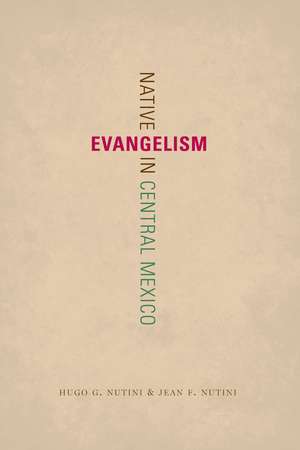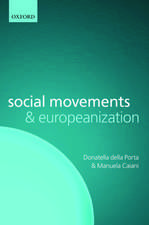Native Evangelism in Central Mexico
Autor Hugo G. Nutini, Jean F. Nutinien Limba Engleză Paperback – 15 aug 2014
This book focuses on two sharply contrastive native evangelical sects in Central Mexico: Amistad y Vida (Friendship and Life) and La Luz del Mundo (The Light of the World). The former, founded in 1982, now has perhaps 120,000 adherents nationwide. It is nonhierarchical, extremely egalitarian, and has no dogmatic directives. It is a cheerful religion that emphasizes charity, community service, and personal kindness as the path to salvation. It attracts new members, mainly from the urban middle class, through personal example rather than proselytizing. La Luz del Mundo, founded in 1926, now has about 350,000 members in Mexico and perhaps one million in the hemisphere. It is hierarchically organized and demands total devotion to the sect’s founder and his son, who are seen as direct links to Jesus on Earth. It is a proselytizing sect that recruits mainly among the urban poor by providing economic benefits within the congregations, but does no community service as such.
Based on ten years of fieldwork (1996–2006) and contextualized by nearly fifty years of anthropological study in the region, Native Evangelism in Central Mexico presents the first ethnography of Mexico’s native evangelical congregations.
Preț: 192.58 lei
Nou
Puncte Express: 289
Preț estimativ în valută:
36.85€ • 37.74$ • 30.66£
36.85€ • 37.74$ • 30.66£
Carte tipărită la comandă
Livrare economică 19 martie-02 aprilie
Preluare comenzi: 021 569.72.76
Specificații
ISBN-13: 9781477307618
ISBN-10: 1477307613
Pagini: 213
Dimensiuni: 140 x 216 x 15 mm
Greutate: 0.2 kg
Editura: University of Texas Press
Colecția University of Texas Press
ISBN-10: 1477307613
Pagini: 213
Dimensiuni: 140 x 216 x 15 mm
Greutate: 0.2 kg
Editura: University of Texas Press
Colecția University of Texas Press
Notă biografică
Hugo G. Nutini (1929–2013) was University Professor in the Department of Anthropology at the University of Pittsburgh. He authored numerous articles and books on central Mexico, including The Mexican Aristocracy: An Expressive Ethnography, 1910–2000; Social Stratification and Mobility in Central Veracruz; and Social Stratification in Central Mexico, 1500–2000 (with B. L. Isaac). Jean F. Nutini, who holds the Maestría en Antropología Social from the Universidad Iberoamericana in Mexico City, has conducted extensive ethnographic research in Mexico. She has published in anthropology with Hugo G. Nutini and in public health with colleagues in the Department of Behavioral and Community Health Sciences at the University of Pittsburgh, where she was Research Associate (2002–2013). Earlier, she taught anthropology and traditional medicine at the Instituto Mexicano de Seguro Social in Córdoba, Veracruz (1983–1987).
Cuprins
- Preface
- Acknowledgments
- Introduction
- 1. Analytical Framework of the Study
- 2. The Theology and Teleology of Amistad y Vida (Cristianos)
- 3. Cristianos: The Structure and Material Organization of the Congregation
- 4. La Luz del Mundo: Theology, Teleology, and Ideology
- 5. La Luz del Mundo: Structure and Ritual-Ceremonial Organization of the Congregation
- 6. The Process of Conversion: Antecedent Factors and Results
- Conclusions
- Notes
- Bibliography
- Index
Recenzii
"The Nutinis demonstrate their bona fides as anthropologists of Mexico with straightforward and incisive description and analysis throughout."
Descriere
A foundational work by a revered pioneer in the study of native evangelism, this book illuminates the psychological, theological, and pragmatic elements of conversion to two of Mexico’s pivotal Protestant evangelical sects, La Luz del Mundo and Amistad y












